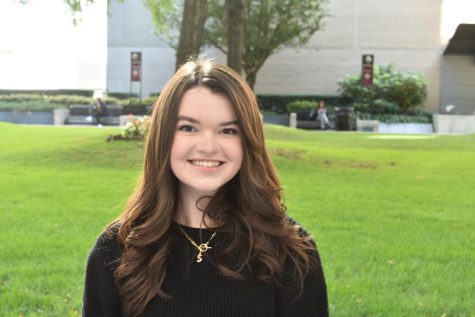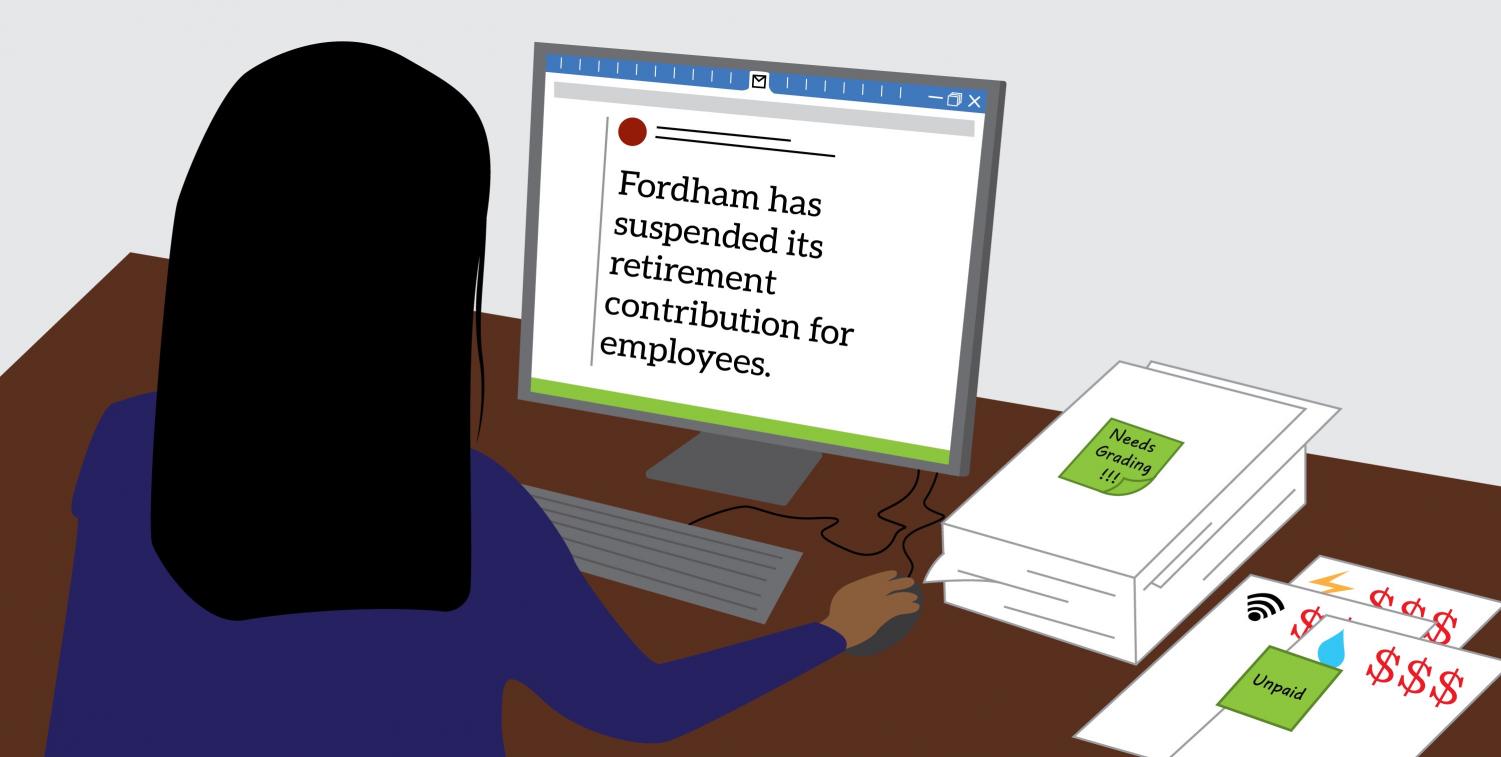Building a retirement fund is something everyone is instructed to do from the time they enter the workforce. Constantly, financial advisers will tell people that they can never start saving early enough and that they should look for an employer who will help them build a steady, reliable retirement fund so that when they finally do decide to take the jump, they’ll be set for the rest of their lives.
In the past, Fordham has regularly contributed to faculty and administration retirement funds. Bob Howe, assistant vice president for communications and special advisor to the president, wrote that the university contributed around $20 million each year for Fiscal Year (FY) 2020 and FY 2019. He also stated the university’s contribution was determined by length of employment and union contracts.
However, the university announced in an Oct. 28 email that it would be suspending retirement contributions for the foreseeable future. In the email, University President Rev. Joseph M. McShane, S.J., and Chair of the Fordham Board of Trustees Robert Daleo stated that this suspension would be “effective for the November 6, 2020 payroll and extending through June 30, 2021.”
This decision was met with immediate backlash from faculty, as they were already enduring a salary freeze they had willingly accepted in order to assist the university with its financial recovery. An Instagram account called @fordhamfacultyspeakout was created on Oct. 27 and has been posting anonymously about these concerns.
“We agreed to the salary freeze on the condition that the university administration sign a contractual agreement that they would negotiate with us in good faith about any further changes to our salary and benefits.” Shiloh Whitney, professor of philosophy
Associate professor of philosophy Shiloh Whitney wrote, “We agreed to the salary freeze on the condition that the university administration sign a contractual agreement that they would negotiate with us in good faith about any further changes to our salary and benefits.” Whitney and other faculty members claim that Fordham violated the agreement held by their union and Fordham because they bypassed negotiations altogether and removed retirement contributions anyway.
Fordham attributed the move to a $9 million budget gap and argued that the suspension of the retirement plan was done in order to “minimize other actions that could have a more direct effect on the core mission of the University.”
Howe further expanded that suspending retirement contributions saves the university $800,000 per pay period, which is roughly $1.6 million per month. “The savings this year won’t equal those amounts because we didn’t suspend a full year of the University’s contribution, only eight months,” he clarified.
This news comes amid a semester where the amount of work faculty members are doing to support their students has increased dramatically, with some feeling as though the work they are doing is exacerbated by the lack of respect they’re getting from the university.
“This shows me that the Fordham board of trustees sees faculty just like they see students: as spoiled peons they can extract money from.” anonymous Instagram contributor
On Oct. 29, one Instagram contributor wrote, “They break their contract with us, walk away from negotiation, saying they’re taking our money and there’s nothing we can do about it — contracts and universities about shared governance be damned. This shows me that the Fordham board of trustees sees faculty just like they see students: as spoiled peons they can extract money from.”
Another post published on the same day echoed this sentiment. “After I have eaten my one meal of the day, I will resume working to prepare for tomorrow’s classes. I will do the same tomorrow, and on the weekends, and every day after that, because I believe in the value of higher education.”
The displeasure among faculty is not just limited to social media. Although restricted by their contracts and concerned about the effect of speaking out on their employment opportunities, there is a general agreement that the university did not handle things properly and are turning to the faculty and staff to shoulder an undue financial burden.
“In the middle of the most difficult week of the (most) difficult semester we have ever had, when we are working harder than we ever had in our lives, and faculty are strained to the breaking point … they broke the contract they made with us and violated the statutes and walked out on negotiations,” Whitney stated.
The university contended that suspending retirement contributions was the only means of preserving its commitment to avoid layoffs and furloughs; in a follow-up to the first email days later on Nov. 3, McShane stated that “it would be more compassionate to temporarily suspend the retirement match than to introduce University wide layoffs or furloughs at this time” but that the university could not “commit to a set term for repayment of the retirement match, because we don’t know when there will be sufficient funds in the budget to do so.”
He also argued that the common suggestions they were receiving — using the contingency fund, committing to a set date to repaying the retirement fund, running a deficit or spending money from the endowment — were all not feasible for the university at this time.
Whitney disagreed, stating that the Fordham administration “presented the retirement suspension as a forced choice between furloughing people and compensating us as our contracts require. But that’s false: there are other available funds, as they’ve acknowledged in negotiations with the faculty.”
In their initial email, McShane and Daleo stated, “The Board of Trustees and the administration deeply appreciate the dedication, resilience, and resourcefulness of the faculty, administrators, and staff in serving our students during what we know is a very stressful period.” These professors say that this is the exact opposite of how Fordham is treating its staff.
“Never once in all the salary and benefit rollbacks since the 2008 recession has anything they have taken been restored.”anonymous faculty member
“Fordham has charged students full price for online courses, and faculty have worked extraordinarily hard … to come through for our students in the online environment, and the result is that the university is not in dire financial straits. So why present the situation as if we are?” asked Whitney.
It was also noted that this is not the first time the university has faced financial pitfalls. Howe wrote that during the 2008 recession, salaries and hiring were frozen, but retirement contributions were not as the “pandemic requires significantly greater budget reductions.”
A faculty member on Instagram explicitly mentioned this, writing, “Never once in all the salary and benefit rollbacks since the 2008 recession has anything they have taken been restored.”
Howe noted that the budget gap this year was due to an inability to accurately plan; the university had initially anticipated a FY 2021 scenario in which there were “overall enrollments of approximately 88% of prior year enrollments,” as well as the prediction that remote learning would only last one semester. This discrepancy led to “significantly less net tuition revenue and room and board revenue.” Fordham usually releases a budget report by this time of the year, but has yet to do so.
“I still believe that Fordham can be the institution it aspires to be.” Shiloh Whitney, professor of philosophy
Faculty members acknowledge the financial setbacks the pandemic has brought — and argue that they’re suffering from them, too — but continue to assert that the suspension of retirement funds with no end date in sight was not a necessary measure.
“We know times are tough, and we were prepared to negotiate about that! But the university was not. So the core issue for us is about the university breaking its own statutes, breaking its contracts with us, taking advantage of this crisis to act unilaterally and take away faculty’s agency, further corporatizing our university,” Whitney wrote. The bottom line: Faculty feel deeply unappreciated and undercompensated for the work they’re putting in, and to them, the university doesn’t appear to be working to rectify that any time soon.
McShane concluded his email with a different message — in his Nov. 3 follow-up, he stated, “We can and will rise to the present challenges … through our sense of shared purpose, our resilience, and the knowledge we are all shouldering the burden together to help Fordham deliver on its promise of a transformative education for our students.”
Whitney disagreed with McShane’s stance. She highlighted her hope in the school — “I still believe that Fordham can be the institution it aspires to be” — but remarked that it would come at a cost.
She called for high-effort initiatives to build a Fordham that valued everyone with fair compensation, saying that “it will take leadership at the highest levels that changes course on these issues. … I would like to see the Board demonstrate that they value the work faculty do and that they respect the mission and integrity of the university, and commit to investing in people and relationships.”



